News from the KüNO consortium
August, 2023
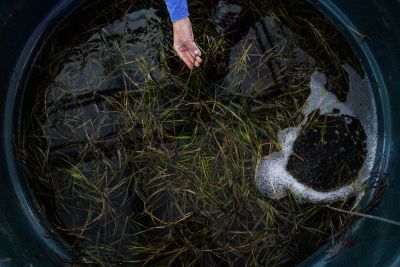
Report on SeaStore at REUTERS: The news agency REUTERS has visited part of the SeaStore team in recent weeks and accompanied them in their work for a few days. Now an online article has been published. This richly illustrated article describes the work of Angela Stevenson (GEOMAR) and volunteers in replanting seagrass on the German Baltic coast.
July, 2023
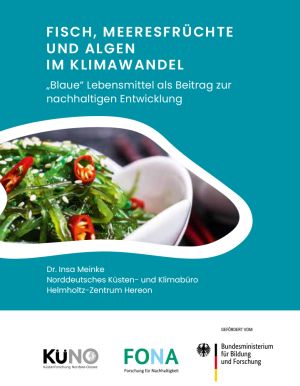
KüNO brochure on "blue" foods as a contribution to sustainable development published: As part of the KüNO umbrella project CoTrans, a brochure entitled "Fish, Seafood and Algae in a Changing Climate - "Blue" Foods as a Contribution to Sustainable Development" was produced. This handbook offers a well-founded introduction to the topic and concretises the fields of action required to ensure that the so-called "blue" foods contribute to promoting sustainability in a changing climatic situation. The brochure is edited by Dr. Insa Meinke, head of the North German Coastal and Climate Office at the Helmholtz Centre Hereon. An overview page on the contents of the handbook can be found here.
Read the press release from 10.07.2023 here. The brochure can be read online here (german only) or ordered as a print version free of charge here.
June, 2023
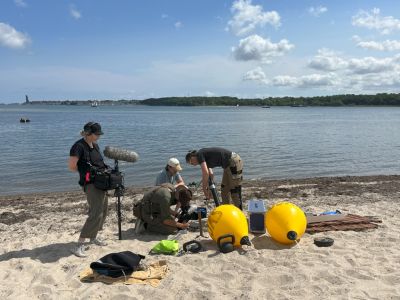
ARTE visits SeaStore: At the end of June, the SeaStore team was visited by Florian Guthknecht and his film team. The filmmakers are working on a film about seaweed for ARTE and the activities of the SeaStore project cannot be missing. Project coordinator Maike Paul (LuFI) together with Lars Kamperdicks (IKK/LuFI) and Robin Bähre (IKK) showed how research is being done in Hanover to increase the success of replantings. Afterwards, the film team travelled on to Kiel. After two days of filming at the SeaStore team at GEOMAR, there was a reunion with the Hanover team, which was accompanied during the installation of measuring instruments for current measurement in a natural seagrass meadow. The entire SeaStore team is excited about the product and looks forward to the planned broadcast in 2024.
June, 2022
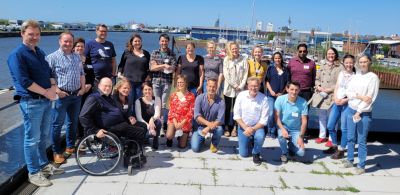
Joint BioWeb-MuSSeL workshop at the Thünen Institute in Bremerhaven: On 16 June, 2022, the colleagues from MuSSeL and BioWeb met in-person. The workshop presented an excellent opportunity for networking and identifying synergies. During the meeting, the peers agreed to join forces to address the research questions that are of concern for both the projects. A need to setup a platform to facilitate exchange of data between the projects as soon as possible was identified. It was agreed that there should a standardized format for sharing model data (forcing, input and output) and field data. Last but not least, it was pledged to continue doing high-quality science and publish results in high impact factor journals, as this would, potentially, help in having the next phases of MuSSeL and Bioweb under KueNO IV consortium.
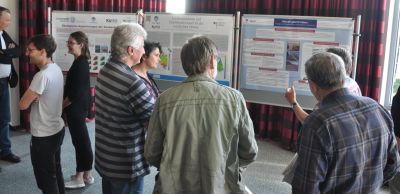
Talk with residents about the effects of sand flushing off the coast of Ahrenshoop: On June 15, residents of the coastal town of Ahrenshoop were informed about the sand flushing that was carried out by STALU VP (State Office for Agriculture and Environment Western Pomerania) on their beach last winter. Researchers from the ECAS-BALTIC project investigated the ecological consequences and the acceptance of this coastal protection measure among the population. They presented their results by means of posters and lectures. Afterwards, there was a joint discussion about coastal dynamics, sea level rise and the expected changes for the Ahrenshoop coast. The sand flushing in Ahrenshoop is welcomed by the citizens, but many also wish for a stronger protection of the cliffs. Find here the compilation of the presented results (in German). Read the press release here (in German).
May, 2022

Podcast on climate change impacts: In the German podcast "Zurück zum Thema" from detektor.fm, KüNO speaker Jochen Hinkel answered questions about the challenges German islands face due to climate change and what the most pressing tasks for the future are. Click here to listen to the podcast (in German).

Exchange on Predictability in Natural and Social Sciences: On 3 May, the KüNO Online Workshop 'Predictability in Natural and Social Sciences' took place as online event. After discussing general challenges of interdisciplinary collaboration in a first workshop last year, the exchange on the topic of 'Predictability' was now deepened here. The speakers from different marine research areas gave insights into their views on the topic and triggered lively discussions among the more than 30 participants. Gary Polhill from the James Hutton Institute in the UK gave a keynote on predictability in complex systems. In breakout groups, discussions were held on how to communicate uncertainties to stakeholders and the public. Finally, it was concluded that researchers should not only communicate their findings in scientific journals, but also engage in adapted communication with stakeholders and society. To avoid confusing statistical uncertainties with results that are not certain, confidence intervals should be emphasized more. The summary and an overview of the workshop presentations can be found here.
April, 2022
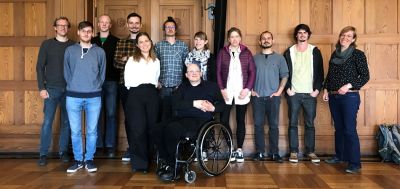
KüNO Young Scientists Workshop in Hamburg: On 27 April, the young scientists of the KüNO network and related projects met at the Hamburg Chamber of Crafts and presented the current status of their research work. Work from the KüNO projects MuSSeL, balt_ADAPT, BluEs, ECAS-Baltic and the DAM project CoastalFutures was presented. In addition to scientific discussions, feedback on the presentations and valuable tips were provided. Although Corona thinned out the field of participants a bit, many intensive discussions could still be held and the participants took away many good suggestions for their work. The presentations can be found in the internal area.
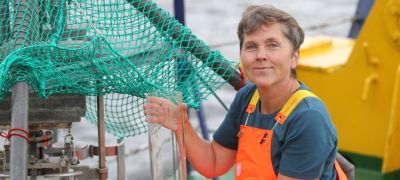
The first recipient of the Björn Carlson Baltic Sea Prize will be KüNO researcher Maren Voß: The Björn Carlson Baltic Sea Prize of the Swedish Björn Carlson Baltic Sea Foundation, which will be awarded for the first time in 2022, will go to Prof. Dr. Maren Voß, coordinator of the KüNO project BluEs and researcher at the Leibniz Institute for Baltic Sea Research Warnemünde (IOW). Maren Voß is being honored for her groundbreaking research on the importance of nitrogen in marine cycles and, in particular, its role in the overfertilization of the Baltic Sea. Using innovative methods, she recorded the different input sources and conversion processes of this nutrient and thus contributed to the increased focus on nitrogen in combating the overfertilization of the Baltic Sea. The prize, worth 3 million Swedish kronor, will be awarded in Stockholm on 3 June, 2022. To the original news.
March, 2022

Expert workshop on the future of the North Sea: On 28 March, 2022, the MuSSeL Foresight Workshop on "Human Stressors in the North Sea" took place. About 40 participants discussed online and on-site at the Center for Marine and Atmospheric Sciences at the University of Hamburg about future trends in nutrient loading, fisheries, offshore wind power and sand extraction. These activities have a direct impact on North Sea habitats and their biotic communities. Therefore, the workshop discussed in detail with experts from science and practice about the future development of these activities and their interactions. The results will feed into the complex assessment of cumulative impacts and identify options for integrated management. The workshop was led by Dr. Vanessa Stelzenmüller from the Thünen Institute of Sea Fisheries. It was organized by the MuSSeL colleagues Dr. Jennifer Rehren, Serra Örey, Dr. Carsten Lemmen, Dr. Shubham Krishna, Prof. Jürgen Scheffran, Dr. Sascha Hokamp, Dr. Matthias Hasenbein and others. A summary of the workshop can be found here.
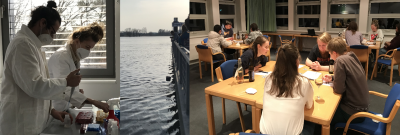
KüNO Spring School "Human impact on the Tidal Elbe": At the end of March, 19 young scientists from the KüNO projects met in Lauenburg (Elbe) to spend a week studying the many aspects of the Tidal Elbe. In excursions, exercises and discussions, the participants learned how climate change and pressure of use influence the ecology, nature and flood protection as well as the perception of the population. Practical insights into laboratory work and modeling of future scenarios complemented the content. Two professional communication trainers gave valuable tricks and tips on how to present complex scientific topics in an interesting way. The topic of career opportunities was also not neglected. Here, invited speakers presented their paths and encouraged participants to think about their own goals. And everyone especially enjoyed the intensive time of personal exchange again. Here you find some impressions.
February, 2022
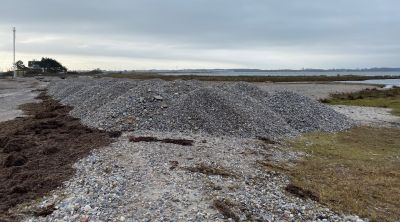
Stakeholder meeting in Schleimünde - ECAS-Baltic explores morphological changes and nature-based coastal protection measure: On 11 February, 2022, the ECAS-Baltic team met with coastal and nature conservation representatives from MELUND, LKN.SH, LLUR and the Jordsand association for a site visit in Schleimünde. There, the knowledge creators gained an overview of the morphological changes and exchanged information with stakeholders about the current situation. The meeting was part of the transdisciplinary research process of ECAS-Baltic and revealed valuable insights into the morphological development of the system and the sometimes controversial discussions about measures in Schleimünde.
Schleimünde is a focus area in ECAS-Baltic and was selected together with stakeholders because the natural barrier system off the mouth of the Schleimünde has an effect as a natural flood protection element in addition to its outstanding ecological value for fauna and flora. The morphological changes observed in the recent past (overtopping of the spit hook in early 2019) raised the question of the extent to which these functions are at risk and can be reconciled in the best possible way in the future. ECAS-Baltic will continue the investigation of nature-based coastal protection solutions in terms of their predictability, applicability and impacts from a natural and social science perspective in Schleimünde.
January, 2022
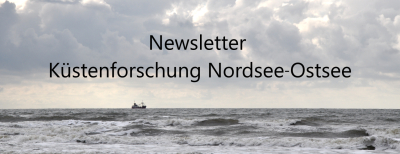
Newsletter with highlights from the KüNO projects: A productive first project year lies behind us. Read here what the projects have achieved - from exciting first results to modern research approaches to more or less visible changes on our coast, which we accompany scientifically. Please also note the date of the 3rd Coastal Symposium "Coast in Transition 2022". This will take place from November 9 to 11, 2022 in Hamburg. You can access the newsletter here.
November, 2021
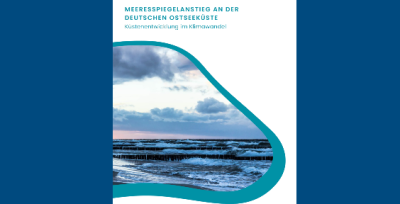
KüNO brochure on the development of the Baltic Sea coast in climate change published: Within the framework of the KüNO umbrella project, a brochure was produced that summarizes the research results on coastal development and coastal adaptation on the German Baltic Sea coast. It provides an overview of sea level rise and coastal protection needs in the coming years. In addition, coastal protection measures and specifically the approaches pursued in the KüNO projects SeaStore and ECAS-BALTIC are presented. The brochure is edited by Dr. Insa Meinke, head of the North German Coastal and Climate Office at the Helmholtz Center Hereon. The brochure can be read online here or ordered as a print version free of charge (in German).
Please participate: Based on a survey (in German), further research results on the topic will be prepared.
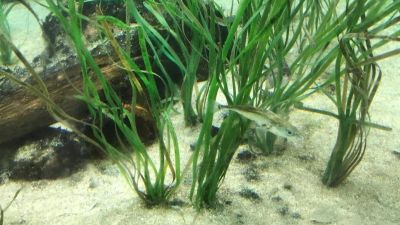
Seagrass for storing CO2: As part of the SeaStore project, seagrass was planted in the Baltic Sea last summer in an elaborate operation. In the podcast "Mission Energiewende", project leader Prof. Maike Paul from Leibniz University Hannover and Tadgh O Corcora from GEOMAR report on how this was done, what difficulties were encountered and why it is nevertheless all worthwhile. In addition, this podcast episode is about the important tasks of HELCOM in the protection of the Baltic Sea and a project that is intended to protect the Baltic Sea from nutrient discharges from agriculture. The link to the podcast can be found here (mainly in German, the report about SeaStore starts at minute 21).
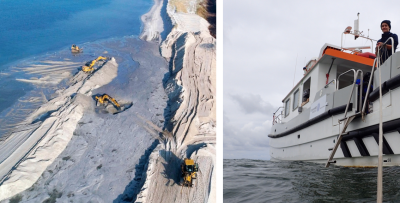
Effects of sand flushing: At the beginning of November, one of the largest flushing measures in Mecklenburg-Vorpommern began in Ahrenshoop. In order to maintain the storm surge safety of the village, the sand removed off Graal-Müritz is to reinforce the foreshore, beach and dune. But what do these measures mean for the ecosystem and how long does it take for conditions to stabilize again? To investigate this, scientists from the universities of Rostock, Kiel and Hanover are monitoring the flushing process. Within the framework of the KüNO project ECAS-BALTIC, sampling is carried out before, during and at several points after the flushing. The interdisciplinary team considers the whole area from the dune to the water. In order to work in the shallow water area, the new research catamaran Limanda of the University of Rostock is used. To read the press release of the state of MV, click here and to learn more about the ECAS-BALTIC project, click here for more information.
September, 2021

Workshop on interdisciplinary collaboration: Interdisciplinary collaboration between social and natural scientists is imperative, but still often fails due to a lack of understanding for the other discipline and communication barriers. To improve collaboration, the online workshop 'Know how' meets 'know why' was held on 6 September, 2021. The workshop brought together information on research approaches and good examples of collaboration in coastal research. Intense discussions in small groups resulted in valuable suggestions for ongoing and future collaborations. For example, both disciplines should jointly define goals from the beginning and regularly exchange information. A detailed summary can be found here.
August, 2021
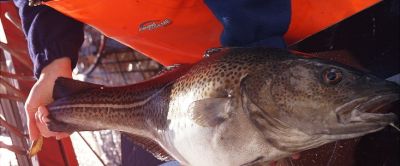
Sustainable fisheries management must take climate change into account: The cod stock in the western Baltic Sea has collapsed massively and recovery is unlikely. The reasons are fishing pressure and climate change. The solution to prevent the collapse of fish stocks is ecosystem-based fisheries management that takes environmental changes into account. Link to the German press release and link to the scientific paper.
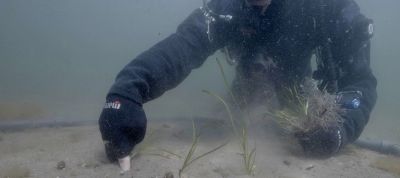
TV report about SeaStore: On August 4 at 6:15 p.m., NDR will broadcast a report on the first planting of seagrass in the Baltic Sea, which was carried out as part of the SeaStore project in June 2021. Viewers will learn about the importance of seagrass as a CO2 reservoir and what questions the project is investigating. The report is in German. Link to the broadcast.
April, 2021
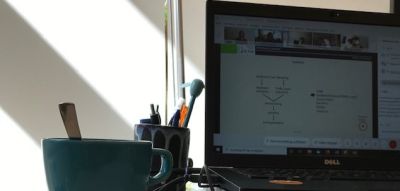
Intensive discussions in several workshops: In April, several meetings took place in which KüNO scientists exchanged views on their work topics. On 21 April, the project members working on transfer tasks met for the 1st meeting of the stakeholder working group, the next day early career researchers met for the 1st Young Scientists Workshop and on 28 April, a workshop on "Species traits & food web analyses in North and Baltic Seas" took place. The latter was also attended by numerous researchers from DAM projects to exchange views on the methods used and to identify opportunities for collaboration. All meetings will be held at regular intervals from now on.
March, 2021
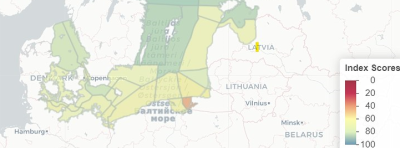
How healthy is the Baltic Sea? An international research team with the participation of the University of Hamburg has developed an index that can be used to assess the condition of the Baltic Sea. This is to be used in the KüNO project balt_ADAPT. How this "Baltic Health Index" (BHI) works and what grade the Baltic Sea currently achieves, you can read here in the open access publication.

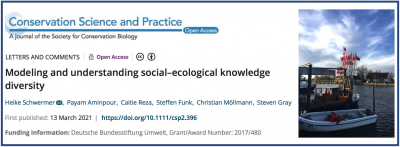
New article published: Heike Schwermer et al. examined differences in knowledge, values, and beliefs among stakeholder groups and present a model that improves understanding of human-environment interactions and could help reduce conflicts and legitimize management plans. Click here for the open access article.
February, 2021
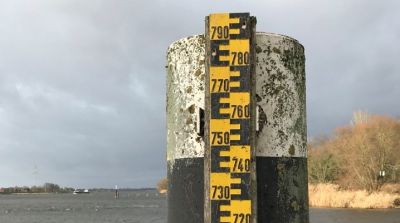
New online tool developed: Around the world, sea levels are rising due to climate change. This is often associated with the fate of people in far-flung regions. But what is the situation on our coasts? How much has sea level risen on the North Sea and Baltic Sea over the last 100 years? Is it rising faster and faster? And what will the future bring? These questions are answered by the newly developed sea level monitor taking into account current water level data. The complete press release with link to the Sea Level Monitor can be found here. The link to the Sea Level Monitor can be found here.
December, 2020
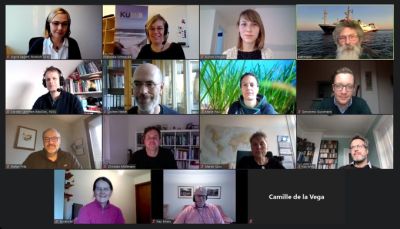
KüNO Steering Committee consolidated: Shortly before Christmas, the new steering committee of KüNO III met for the first time. The coordinators of the 7 new projects discussed in a video conference how to foster future collaboration between the projects. A joint kick-off meeting in March as well as cross-cutting workshops and young scientists seminars were planned. Prof. Ulrich Bathmann (IOW), who has been involved in the KüNO network from the beginning, was elected as the first speaker of the steering committee. From October 2021, PD Dr. Jochen Hinkel (Global Climate Forum) will take over this task, followed by Prof. Ingrid Kröncke (Senckenberg am Meer) in the last project year.
November, 2020
Start of KüNO III: The third phase of KüNO starts with new projects, each with a duration of three years. The six new research consortia balt_ADAPT, BioWeb, BluEs, ECAS-BALTIC, MuSSeL and SeaStore will be linked by the umbrella project CoTrans and supported in the synthesis and transfer of project results. A joint kick-off meeting will be held on March 15 and 16, 2021. An overview of the projects with links to more information can be found here.
Are the big predators returning to the North Sea? The press release (in German) on the project launch of Bioweb can be found here.
How does the Baltic fishery survive without cod and herring? The press release (in German) on the project launch of balt_ADAPT can be found here. An interview (in German) with Prof. Christian Möllmann on the project launch here.
What do we know about climate, climate change and their impacts in northern Germany? The current state of research is summarized in a comprehensible way in the new handbook "Northern Germany in Climate Change", edited by Dr. Insa Meinke, head of the North German Coastal and Climate Office at Helmholtz-Zentrum Geesthacht (HZG) and member of the KüNO consortium. The press release (in German) and the download link of the handbook can be found here.
October, 2019
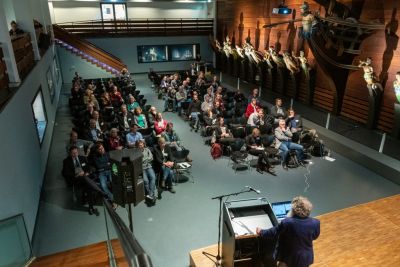
Successful conclusion of KüNO II: At the final meeting in the Altonaer Museum in Hamburg, results of the research work of the KüNO II collaborative projects were presented and discussed with 90 participants from science and practice. The presentations cover a wide range of topics from the field of coastal ecosystem research, which includes the research collaborations BACOSA, NOAH, MOSCCO, SECOS and STopP, and the field of coastal engineering, which includes the research collaborations ALADYN, EcoDike, EXTREMENESS, LivingCoastLab, PADO and STENCIL. More information here.
January, 2019
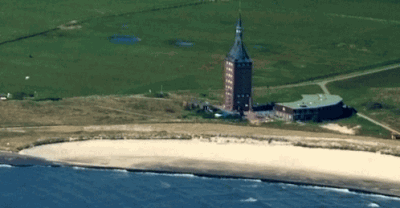
Future research questions defined: In February 2018, at the invitation of the German Marine Research Consortium (KDM), coastal marine researchers and stakeholder representatives met at a 3-day symposium in Berlin to discuss the progress of coastal marine research, derive open questions, and identify future challenges. As a result of this process, we are now publishing fact sheets summarizing the research questions for the future. The documents were handed over to representatives of the BMBF at the event "Research for the Future of the Seas" on 16 January, 2019 in Berlin. More information and the (German) fact sheets "Forschen für die Küste" can be found here.
September, 2018
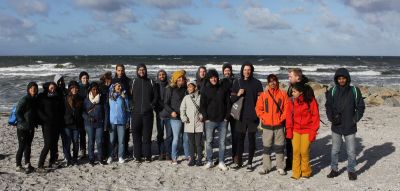
Coastal Summer School: 19 scientists from 11 nations came to the Baltic Sea island of Hiddensee for the Coastal Summer School "Coastal Dynamics - Consequences for Coastal Protection and Ecology" to deal with coastal research in depth. On Hiddensee and on the research vessel ELISABETH MANN BORGESE, they spent 12 days gaining insight into geological processes of coastal dynamics, the resulting requirements for coastal protection and the ecological consequences of human intervention in natural dynamics. They were accompanied by 21 experts who provided them with the latest interdisciplinary knowledge on the main topic and discussed future challenges of coastal research with them. To the press release click here.
August, 2018
Current results from the KüNO projects: The KüNO Annual Conference 2018 took place on 28 and 29 August in Hannover. At the annual meeting, latest results from ongoing research of the KüNO collaborative projects were presented and discussed with 80 participants from science and practice. The results presentations covered a wide range of topics from the field of coastal marine ecosystem research, which includes the BACOSA, NOAH, MOSCCO, SECOS and STopP collaborations, and the field of coastal engineering, which includes the ALADYN, EcoDike, EXTREMENESS, LivingCoastLab, PADO and STENCIL collaborations. In addition, the exchange between colleagues from science and practice was deepened in workshops on the cross-cutting topics "Interactions between ecosystem and sediment dynamics" and "Ecosystem services promoting coastal protection". The program and some selected presentations can be found here.The program and some selected presentations can be found here.
February, 2018
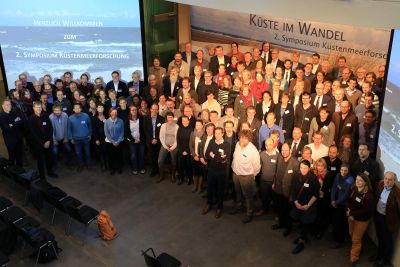
KüNO Symposium "Coast in Transition": Under the motto "Coast in Transition", around 180 experts from over 60 institutions came together at the Berlin Environmental Forum. For three days, they worked out together where the future needs in coastal marine research lie and with which research strategies they can be met. Organized by the German Marine Research Consortium (KDM) the symposium is an important part of the agenda process organized by the German Federal Ministry of Education and Research (BMBF) as part of the MARE:N funding program. Its aim is to bring research, authorities, users and society closer together to meet the challenges of marine research geared towards sustainability. More information about the event here. The results of the consultation process have been published in "Coast in Transition - Research Needs in Coastal Marine Research North Sea and Baltic Sea" (download here).
October, 2017
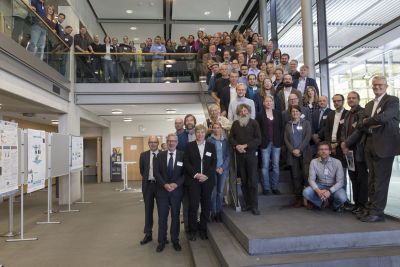
Meeting of new and old KüNO alliances: At the annual meeting of the KüNO alliance, latest results from ongoing research of the KüNO alliance projects were presented and discussed with 135 participants from science and practice. The results presentations covered a wide range of topics from the field of coastal marine ecosystem research, which includes the BACOSA, NOAH, MOSCCO, SECOS and STopP consortia, and the field of coastal engineering, which includes the ALADYN, EcoDike, EXTREMENESS, LivingCoastLab, PADO and STENCIL consortia. On selected cross-cutting topics "Benefits and Uses of the KüNO Data Portal and Habitat Atlases", "Ecosystem Services" and "Building with Nature" the exchange was deepened in workshops. The program and selected presentations can be found here. The BMBF also reports about the annual conference on the FONA page: read more.
September, 2017
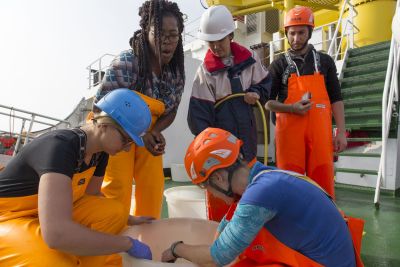
How to govern marine environment: Baltic Sea and sediment services as a case study: The Coastal Summer School organized by KüNO, HZG, IOW and AWI provided an interdisciplinary overview of topics related to the functioning of the marine environment and its possible response to human impacts and governance. Experienced scientists from the fields of physical oceanography, sedimentology, biogeochemistry, marine biology, coastal ecology, marine geology and economics shared their knowledge and taught the young scientists during two intensive weeks in the city of Lauenburg and on a daily trip with the camper Elisabeth Mann Borgese in the Bay of Lübeck with state-of-the-art information and practical training. A review of the participants can be found here.
June, 2016
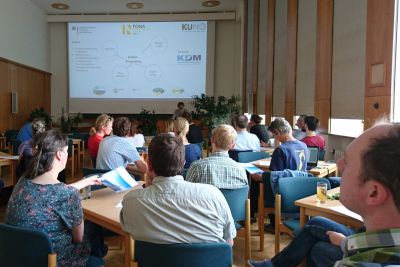
The seafloor as a high-performance site: The KüNO network presents its current results. The focus is on the performance of the seafloor of the North Sea and Baltic Sea and its biocoenosis. The scientists of the project network make their extensive analyses available to authorities and the interested public via data portals. In their synthesis phase, which began this year, the project consortia go one step further and aim to evaluate the services of the seabed. To the press release here.
November, 2015
What has already been achieved? The 2nd KüNO annual meeting took place at the Institute for Baltic Sea Research Warnemünde. The KüNO projects presented their current results. To the program.
October, 2015
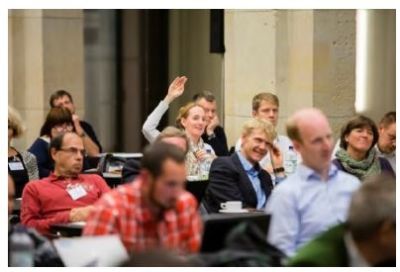
Building a new network: More than 100 international scientists met in Berlin for the "Foresight Symposium Future Coast Europe". The overall goal of the 3-day event was to elaborate a network of partners working in well-studied areas of European coastal and regional seas with a long-standing research experience to develop a joint research program for a fully integrated coastal zone management. This will provide the scientific basis for future European collaborative projects. More information here.
April 2015
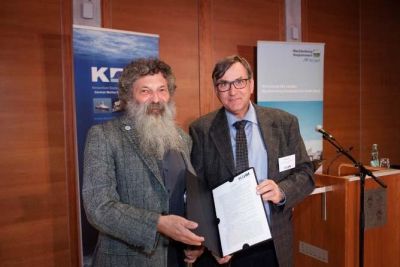
Symposium "Küste 2025": At the symposium "Küste 2025" organized by KüNO and KDM, the state of research was discussed by leading scientists of coastal research in Germany and from this the research needs for the next decade were derived in discourse (more information about the event here). As a result of this symposium, the "Altona Declaration" was drafted. With this, the German Marine Research Consortium concludes a consultation process on the research needs in coastal research and thus supports the development of the BMBF framework program "Research for Sustainable Development (FONA)". To the download of the "Altona Declaration (in German).
September, 2014
Training of young scientists: The Coastal Summer School "Marine benthic habitats - function of sediments and valuation of their services" took place in Lauenburg on the Elbe and was jointly organized by HZG, AWI and IOW.

